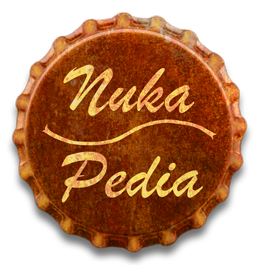Ivan Pozdeev (talk | contribs) Tag: sourceedit |
Ivan Pozdeev (talk | contribs) (expansion) Tags: Visual edit apiedit |
||
| Line 13: | Line 13: | ||
'''Character reaction''' is a game mechanic in ''[[Fallout]]'' and ''[[Fallout 2]]''. It reflects general attitude of an NPC towards the protagonist. The reaction can be good, neutral of bad. |
'''Character reaction''' is a game mechanic in ''[[Fallout]]'' and ''[[Fallout 2]]''. It reflects general attitude of an NPC towards the protagonist. The reaction can be good, neutral of bad. |
||
| + | Reaction value is composed of two components: ''base reaction'' and ''static reaction''. Base reaction is preserved between dialogues while static reaction isn't. |
||
| ⚫ | |||
==Initial reaction== |
==Initial reaction== |
||
| − | |||
Initial reaction is calculated from multiple factors: |
Initial reaction is calculated from multiple factors: |
||
| − | * [[Charisma]] compared to the NPC's Charisma |
+ | * [[Charisma]] compared to the NPC's Charisma, only upon the first conversation |
| + | ** [[Karma]] has no direct effect (the code is commented out), only through relevant titles |
||
| − | * [[Karma]] |
||
* [[Town reputation]] |
* [[Town reputation]] |
||
* [[Reputation title]]s |
* [[Reputation title]]s |
||
* [[Presence]] perk and [[Sex Appeal]] trait |
* [[Presence]] perk and [[Sex Appeal]] trait |
||
| − | ** [[Cult of Personality]] perk has no effect (the |
+ | ** [[Cult of Personality]] perk has no effect (the code is commented out) |
| − | ** [[Karma Beacon]] perk also has no effect ( |
+ | ** [[Karma Beacon]] perk also has no effect (the code is unused) |
| ⚫ | |||
| ⚫ | |||
| ⚫ | |||
| − | |||
| ⚫ | |||
* [[Den]] |
* [[Den]] |
||
| Line 54: | Line 52: | ||
** [[Salvatore's man]] |
** [[Salvatore's man]] |
||
** Strangely, [[Wright's child]]ren playing a game in front of their mansion |
** Strangely, [[Wright's child]]ren playing a game in front of their mansion |
||
| − | * [[ |
+ | * [[Redding]] |
** [[Obidiah Hakeswill]] |
** [[Obidiah Hakeswill]] |
||
| + | * [[San Francisco]] |
||
** Strangely, [[Dave Handy]] |
** Strangely, [[Dave Handy]] |
||
** [[Hubologist]]s in robes |
** [[Hubologist]]s in robes |
||
| Line 71: | Line 70: | ||
** [[Karla]] |
** [[Karla]] |
||
** [[Phil (Khans)]] |
** [[Phil (Khans)]] |
||
| + | |||
| + | == Changing == |
||
| ⚫ | |||
| + | |||
| + | There are also scripted changes by various amounts. |
||
==Under the hood== |
==Under the hood== |
||
| − | + | It's an integer from -100 to 100, with 25 and higher for Good, -25 or lower for Bad and Neutral for in-between. There's also a separate variable from -4 to 4 holding just the level. After one is changed, the other is converted to reflect the result. Both variables are recalculated each time a conversation starts, only the base reaction is saved. |
|
| + | |||
| + | Base reaction: |
||
| + | * On the first conversation: each point of PC's [[Charisma]] over NPC's: +5 (if higher) / -5 (if lower) |
||
| + | * After that, it's only altered by scripted changes |
||
| + | Initial static reaction: |
||
| + | * [[Sex Appeal]]: ±20 |
||
| + | * Each level of [[Presence]]: +10 |
||
| + | * Each level of [[reputation title]] for general Karma: ±5 |
||
| + | * [[Berserker]]: -20 |
||
| + | * [[Champion]]: +20 |
||
| + | * [[Childkiller]]: -30 |
||
| + | * [[Slaver (reputation)|Slaver]]: -50, -25, 0 or +25 (mostly 0) |
||
| + | * Each 2 points of [[town reputation]]: ±1 |
||
| + | Changes: |
||
| + | * The dialogue options adjust the level by one or two (?). |
||
| + | * There are also scripted changes by various amounts as well as direct assignments. They can affect either base reaction or the effective reaction. |
||
==Effects== |
==Effects== |
||
| − | Compared to how much thought was put into the reaction system, it's |
+ | Compared to how much thought was put into the reaction system, it's largely unused. Only for very few NPCs does it affect the course of the dialogue. The most prominent effect it has on gameplay is slightly affecting barter prices. |
| + | |||
| + | A possible reason may be that it's proved to be excessively restrictive. There are few ways to improve an unfavorable reaction once it's established, so it would effectively lock out a large portion of the game from a player wishing to play as anything other than a goody-two-shoes. |
||
[[Category:Fallout gameplay]] |
[[Category:Fallout gameplay]] |
||
Revision as of 13:45, 19 July 2017

|

|

|
| Tandi's good, neutral and bad reaction images |
Character reaction is a game mechanic in Fallout and Fallout 2. It reflects general attitude of an NPC towards the protagonist. The reaction can be good, neutral of bad.
Reaction value is composed of two components: base reaction and static reaction. Base reaction is preserved between dialogues while static reaction isn't.
Initial reaction
Initial reaction is calculated from multiple factors:
- Charisma compared to the NPC's Charisma, only upon the first conversation
- Karma has no direct effect (the code is commented out), only through relevant titles
- Town reputation
- Reputation titles
- Presence perk and Sex Appeal trait
- Cult of Personality perk has no effect (the code is commented out)
- Karma Beacon perk also has no effect (the code is unused)
Characters marked as "evil" have their reaction modifiers from reputation titles (except Childkiller) backwards. Slaver title's effect sign rather depends on what the character thinks of slavers.
In only a few locations are appropriate characters marked as "evil" for this purpose in Fallout 2:
- Den
- Strangely, Rebecca Dyer
- Enclave Oil Rig
- New California Republic (town)
- Buster
- Lenny (NCR)
- Merk
- Mira
- Merk's guard
- Oswald
- Rawhide Saloon patrons
- Skeeter
- Vortis' holding center guards
- Vortis
- New Reno
- Bishop's man
- Drug dealers
- Mordino's man
- Ramirez
- Salvatore's man
- Strangely, Wright's children playing a game in front of their mansion
- Redding
- San Francisco
- Strangely, Dave Handy
- Hubologists in robes
- Juan Cruz and Vikki Goldman
- Lo Pan
- AHS-7
- AHS-9
- Vault 13
- Vault 15
Changing
Reaction is changed by saying nice or mean things to the character by choosing appropriate dialogue options. For talking heads, the character's expression visibly changes.
There are also scripted changes by various amounts.
Under the hood
It's an integer from -100 to 100, with 25 and higher for Good, -25 or lower for Bad and Neutral for in-between. There's also a separate variable from -4 to 4 holding just the level. After one is changed, the other is converted to reflect the result. Both variables are recalculated each time a conversation starts, only the base reaction is saved.
Base reaction:
- On the first conversation: each point of PC's Charisma over NPC's: +5 (if higher) / -5 (if lower)
- After that, it's only altered by scripted changes
Initial static reaction:
- Sex Appeal: ±20
- Each level of Presence: +10
- Each level of reputation title for general Karma: ±5
- Berserker: -20
- Champion: +20
- Childkiller: -30
- Slaver: -50, -25, 0 or +25 (mostly 0)
- Each 2 points of town reputation: ±1
Changes:
- The dialogue options adjust the level by one or two (?).
- There are also scripted changes by various amounts as well as direct assignments. They can affect either base reaction or the effective reaction.
Effects
Compared to how much thought was put into the reaction system, it's largely unused. Only for very few NPCs does it affect the course of the dialogue. The most prominent effect it has on gameplay is slightly affecting barter prices.
A possible reason may be that it's proved to be excessively restrictive. There are few ways to improve an unfavorable reaction once it's established, so it would effectively lock out a large portion of the game from a player wishing to play as anything other than a goody-two-shoes.
